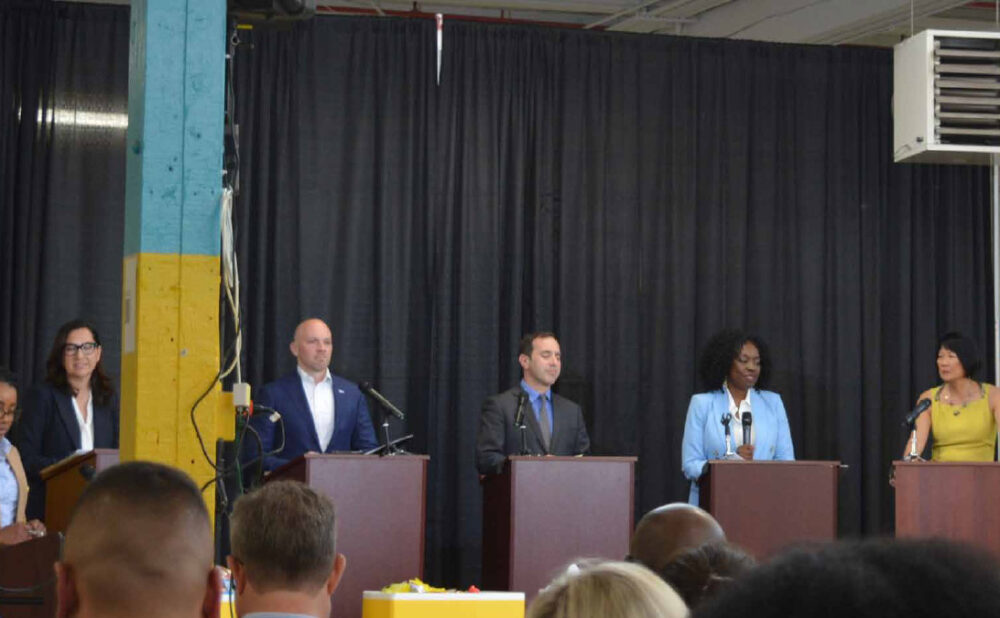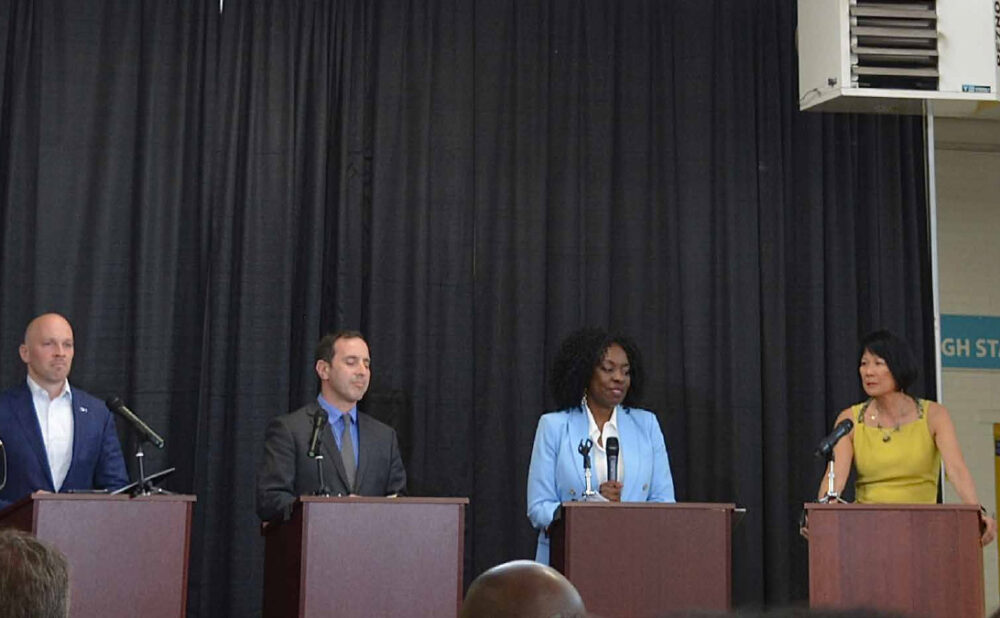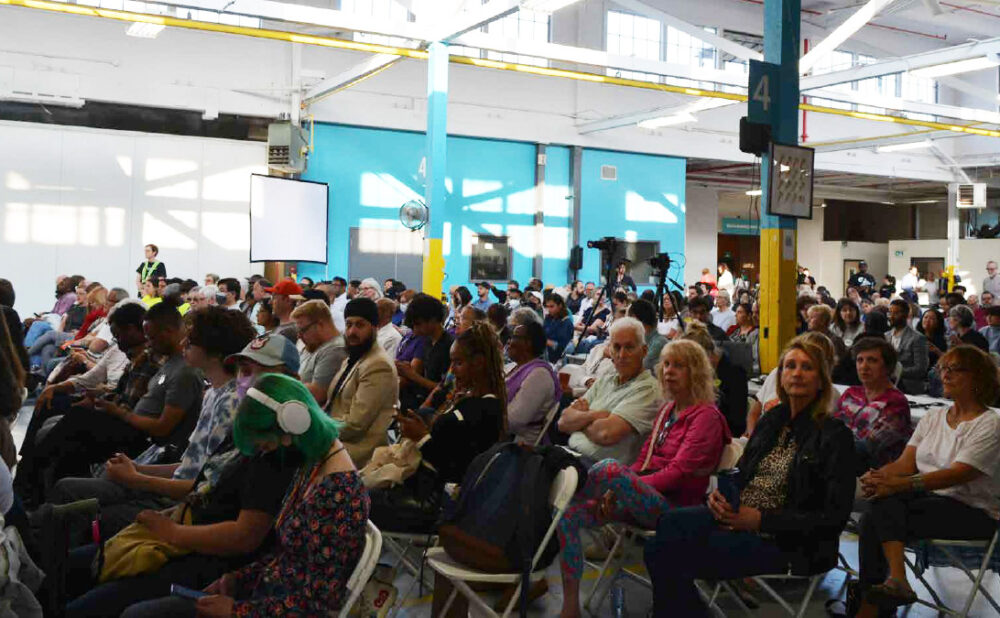First mayoralty all-candidates meeting leaves first-time attendee wanting more
Five of six leading candidates show true stuff when responding to stage-crasher
Toronto Mayoralty First All-Candidates’ Debate
Where: Daily Bread Food Bank HQ
When: Mon., May 15
Vibe: Tilley-hat crew waiting to be wowed; they weren’t
Highlight: Watching the politicians’ various reactions to an unfortunate stage-crashing incident.
I DON’T SPEND A LOT OF TIME IN ETOBICOKE, but Monday (May 15), I find myself a navigating massive west-end parking lot that contains the equally massive — and bleak — Daily Bread Food Bank. I join 300 other Torontonians waiting for the first major debate of the upcoming municipal election, this one on the topic of affordability. Five of the six top-polling candidates are attending: Brad Bradford, Mitzie Hunter, Olivia Chow, Ana Bailão and Josh Matlow.
For those keeping score, Bradford represents the most conservative in attendance, followed by Bailão. Recently ex-Liberal MPP Hunter is in the middle with Matlow and Chow on the left.
The most conservative candidate of the six, ex-Toronto police chief Mark Saunders, has declined to attend — a fact that is commented on by Hunter during her opening remarks
“I know there is a candidate who is not here today,” says Hunter. “It is unfortunate because, if you are running for mayor of our city, you have to care about those who are hungry and those who don’t have enough.”
I’m looking forward to the debate; this is my first time attending one and, at 20 years old, this is one of the first elections I get to vote in. I’m noticeably one of the only people under the age of 40 in the room, but even so, my energy seems to match that of the crowd. The event is fully booked, and people appear excited. Clearly, the people here consider this election important; hopefully, it’s something that will be reflected in the polls on voting day.
Many have apparently already decided for whom they are going to vote — I catch multiple people in my immediate vicinity wearing Olivia Chow pins. Chow seems to be the clear crowd favourite (she’s also leading in early polls), inspiring enthusiastic applause at many points during the evening.
Over the next two hours, the candidates talk about the cost and safety of the TTC, the increasing levels of food insecurity in the city and, of course, the severe housing crisis our city is facing. My main takeaway from the debate? All five candidates think poverty is bad and we should do something about it.
I’m being glib and maybe a bit reductive, but while there’s a lot of acknowledging how serious different aspects of the affordability crisis are, I don’t feel there are a lot of direct or detailed solutions being provided. I hear a lot of “we need” coming from the candidates but not a lot of “we will” and “this is how.”
Moderator Maggie John, of Global TV, actually has candidates re-answer questions on more than one occasion, as their answers sometimes feel off topic or vague.
When proper solutions are offered, I’m left wondering how candidates will be able to fund their initiatives, given how few revenue-generation tools the city has.
Housing is frequently referred to throughout the debate, even when the questions are about other things, like food security.
“Of course, the root of the problem is housing,” says Chow. “You’ve heard all of us say the same thing. So, first, we have to build affordable housing.”
It’s a hot topic, but also a difficult one to fix. Matlow, Hunter and Chow all talk about their housing plans, which include introducing a city agency to act as a developer, ensuring that new housing isn’t solely being built by “for-profit” private developers. This is a compelling idea, but I’m curious how they’d be able to pull that off. Nonetheless, these ideas draw an overwhelming amount of support from the audience, greeted by enthusiastic applause when brought up.
It seems like there is a political appetite for new and creative ideas to address the housing crisis. I would suggest checking out Hunter and Matlow’s in-depth plans yourself, as none of them go into too much detail on stage. Chow will release a more detailed plan in the coming weeks, as right now hers is somewhat lacking in specifics .
When talking about transit, everyone on stage agrees on the importance of expanding public transit out to underserved parts of the city and reversing budget cuts to the TTC; however, the conversation of how to actually pay for the cost of reversing service cuts and improving reliability has to be explicitly prompted by the moderator.
“I did ask about making TTC affordable, and reliable,” says John, who is a hands-on moderator throughout. “We heard a lot about safety, which I appreciate, but I want to understand the financial changes and revenue tools specifically.”
Candidates Bradford and Chow both speak strongly about negotiating with provincial and federal governments to get more operational funding. Bailão talks of uploading DVP operating costs to the province to free up some funding for TTC though Ford has already declared that’s a no go. Matlow suggests a commercial parking levy in addition to the aforementioned proposals. Most of these strategies seem to depend on provincial buy-in, which doesn’t feel like a sure thing with Ford as premier. Unfortunately, whoever wins the election will inherit quite the challenge; a lot of the things that would be best for this city are also things that our premier is opposed to.
Bailão makes a point of talking about the importance of a good working relationship between Toronto’s mayor and the other levels of government in her closing remarks: “On June 26, Toronto has a choice. They can choose opposition, they can choose somebody that will work only against the other forms of governments. I will be ready to stand up, to collaborate with other orders of government.”
It is important to note though, that Mayor John Tory has played nice with Ford over the past five years, to negative consequences for the city. We can’t continue the same strategy and hope for different results — we need a mayor who will go to the provincial and federal governments and stand strong.
All five candidates claim to want the same things for the city: affordable and reliable food, affordable housing, and reliable transit. But while we’re hearing what they’re saying, we are also seeing what some of them have been doing , and their money is not where their mouths are with Bradford and Bailão in particular being haunted by a past that saw them support many cuts especially to transit.
As fate would have it, we are given an opportunity to see the candidates react to an intense situation in real time. About two-thirds of the way through the debate, the stage is stormed by perennial fringe candidate Kevin Clarke. Chow quickly recovers from the initial shock of having a screaming man run up on stage and calmly tries to intervene and assist in the situation, leaving the stage to offer soothing words while Matlow does his best to fix the backdrop partially torn down by Clarke.
While progressives jump up to act, Hunter heads towards the fuss, satisfied to watch Chow handling things, supportively I suppose .
Bailão never really seems too engaged in the crisis while Bradford looks down at his phone, getting up to help fix the backdrop when he notices Matlow is already on it.
I appreciate the compassion displayed by Chow and the proactivity shown by Matlow.
Once the debate resumes, TTC becomes the hot topic, and I recall Bradford and Bailão have a consistent record of voting for TTC service cuts and fare increases. When asked why he has supported TTC cuts, Bradford says that being in government is about making hard decisions. This response does not satisfy the people in the audience, who hoot and heckle their disagreement.
Matlow has some really interesting transit-positive ideas in his platform including restoring previous service levels, build more LRTs on the city’s east side and create a Scarborough busway. He comes across as charismatic and confident during the debate; but I’m not confident in his ability to work well with the rest of city hall. Just recently, he was docked pay for complaints filed by two members of the city staff, and he hasn’t managed to pass a lot of motions during his time on council. Hunter seems well-intended, but she just doesn’t stand out policy or charisma wise. .
Chow’s progressive legacy is public record and includes introducing student breakfast programs and fighting for free childcare, which is the record and legacy I most trust; however, voters don’t have a long memory, and legacy and name recognition alone won’t cut it this time. Chow has no choice but to inspire people to come out and vote, or else she too will fall victim to voter apathy.
Since this is only the first major debate of the election campaign, I’m hoping that we might see stronger performances to come. With such low voter turnout in the last election, inspiration and hope is something this city needs. There is a clear disconnect between how many people in Toronto want change versus how many people actually feel excited about their candidate options.
As I pick my way through the slowly-moving crowd back out into the bleak parking lot, I feel disappointed, less excited than I was heading in; I fear that the stage-rushing incident will be the biggest take away from this event. I’m not leaving fuelled by great oration or a powerful, pithy quote I can share with my friends from some candidate who dazzled me.
But, with over a month until election day, there is still time for a candidate to come forward with a plan that can breathe new life into the city and inspire people to show up at the ballot box.
Brighid Fry is lead singer and songwriter with the band Housewife, formerly of Moscow Apartment. She will be part of the team covering the current mayoral election for NEXT.








